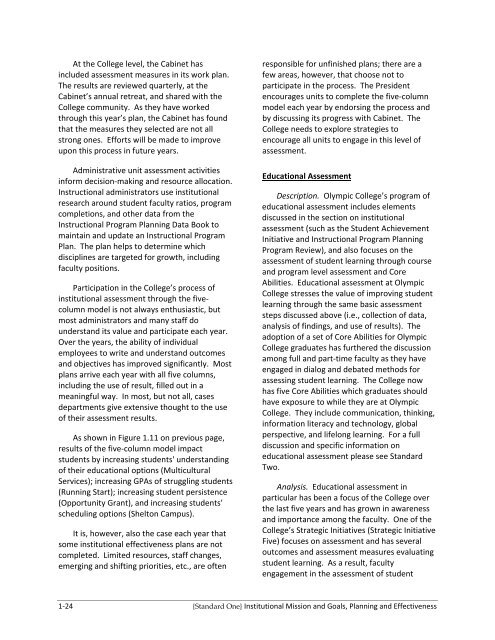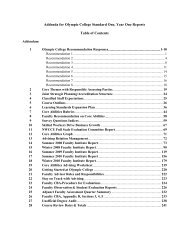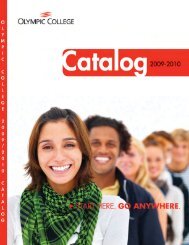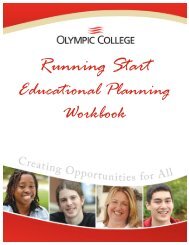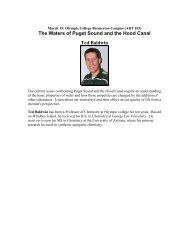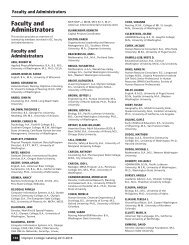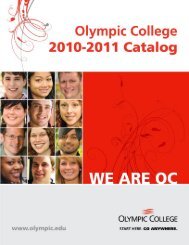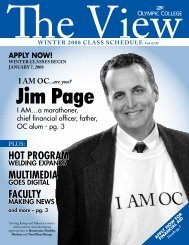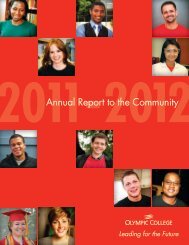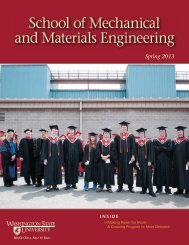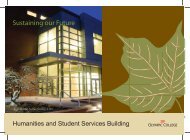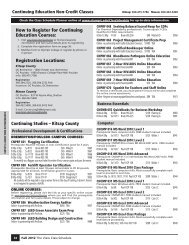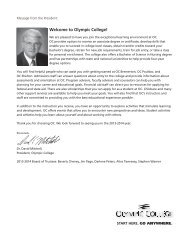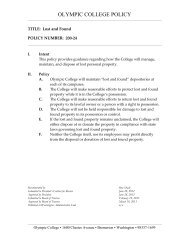Self-Study Report - Olympic College
Self-Study Report - Olympic College
Self-Study Report - Olympic College
Create successful ePaper yourself
Turn your PDF publications into a flip-book with our unique Google optimized e-Paper software.
At the <strong>College</strong> level, the Cabinet has<br />
included assessment measures in its work plan.<br />
The results are reviewed quarterly, at the<br />
Cabinet’s annual retreat, and shared with the<br />
<strong>College</strong> community. As they have worked<br />
through this year’s plan, the Cabinet has found<br />
that the measures they selected are not all<br />
strong ones. Efforts will be made to improve<br />
upon this process in future years.<br />
Administrative unit assessment activities<br />
inform decision-making and resource allocation.<br />
Instructional administrators use institutional<br />
research around student faculty ratios, program<br />
completions, and other data from the<br />
Instructional Program Planning Data Book to<br />
maintain and update an Instructional Program<br />
Plan. The plan helps to determine which<br />
disciplines are targeted for growth, including<br />
faculty positions.<br />
Participation in the <strong>College</strong>’s process of<br />
institutional assessment through the fivecolumn<br />
model is not always enthusiastic, but<br />
most administrators and many staff do<br />
understand its value and participate each year.<br />
Over the years, the ability of individual<br />
employees to write and understand outcomes<br />
and objectives has improved significantly. Most<br />
plans arrive each year with all five columns,<br />
including the use of result, filled out in a<br />
meaningful way. In most, but not all, cases<br />
departments give extensive thought to the use<br />
of their assessment results.<br />
As shown in Figure 1.11 on previous page,<br />
results of the five-column model impact<br />
students by increasing students' understanding<br />
of their educational options (Multicultural<br />
Services); increasing GPAs of struggling students<br />
(Running Start); increasing student persistence<br />
(Opportunity Grant), and increasing students’<br />
scheduling options (Shelton Campus).<br />
It is, however, also the case each year that<br />
some institutional effectiveness plans are not<br />
completed. Limited resources, staff changes,<br />
emerging and shifting priorities, etc., are often<br />
responsible for unfinished plans; there are a<br />
few areas, however, that choose not to<br />
participate in the process. The President<br />
encourages units to complete the five-column<br />
model each year by endorsing the process and<br />
by discussing its progress with Cabinet. The<br />
<strong>College</strong> needs to explore strategies to<br />
encourage all units to engage in this level of<br />
assessment.<br />
Educational�Assessment�<br />
Description.��<strong>Olympic</strong> <strong>College</strong>’s program of<br />
educational assessment includes elements<br />
discussed in the section on institutional<br />
assessment (such as the Student Achievement<br />
Initiative and Instructional Program Planning<br />
Program Review), and also focuses on the<br />
assessment of student learning through course<br />
and program level assessment and Core<br />
Abilities. Educational assessment at <strong>Olympic</strong><br />
<strong>College</strong> stresses the value of improving student<br />
learning through the same basic assessment<br />
steps discussed above (i.e., collection of data,<br />
analysis of findings, and use of results). The<br />
adoption of a set of Core Abilities for <strong>Olympic</strong><br />
<strong>College</strong> graduates has furthered the discussion<br />
among full and part-time faculty as they have<br />
engaged in dialog and debated methods for<br />
assessing student learning. The <strong>College</strong> now<br />
has five Core Abilities which graduates should<br />
have exposure to while they are at <strong>Olympic</strong><br />
<strong>College</strong>. They include communication, thinking,<br />
information literacy and technology, global<br />
perspective, and lifelong learning. For a full<br />
discussion and specific information on<br />
educational assessment please see Standard<br />
Two.<br />
Analysis.��Educational assessment in<br />
particular has been a focus of the <strong>College</strong> over<br />
the last five years and has grown in awareness<br />
and importance among the faculty. One of the<br />
<strong>College</strong>’s Strategic Initiatives (Strategic Initiative<br />
Five) focuses on assessment and has several<br />
outcomes and assessment measures evaluating<br />
student learning. As a result, faculty<br />
engagement in the assessment of student<br />
1-24 {Standard�One}�Institutional Mission and Goals, Planning and Effectiveness


